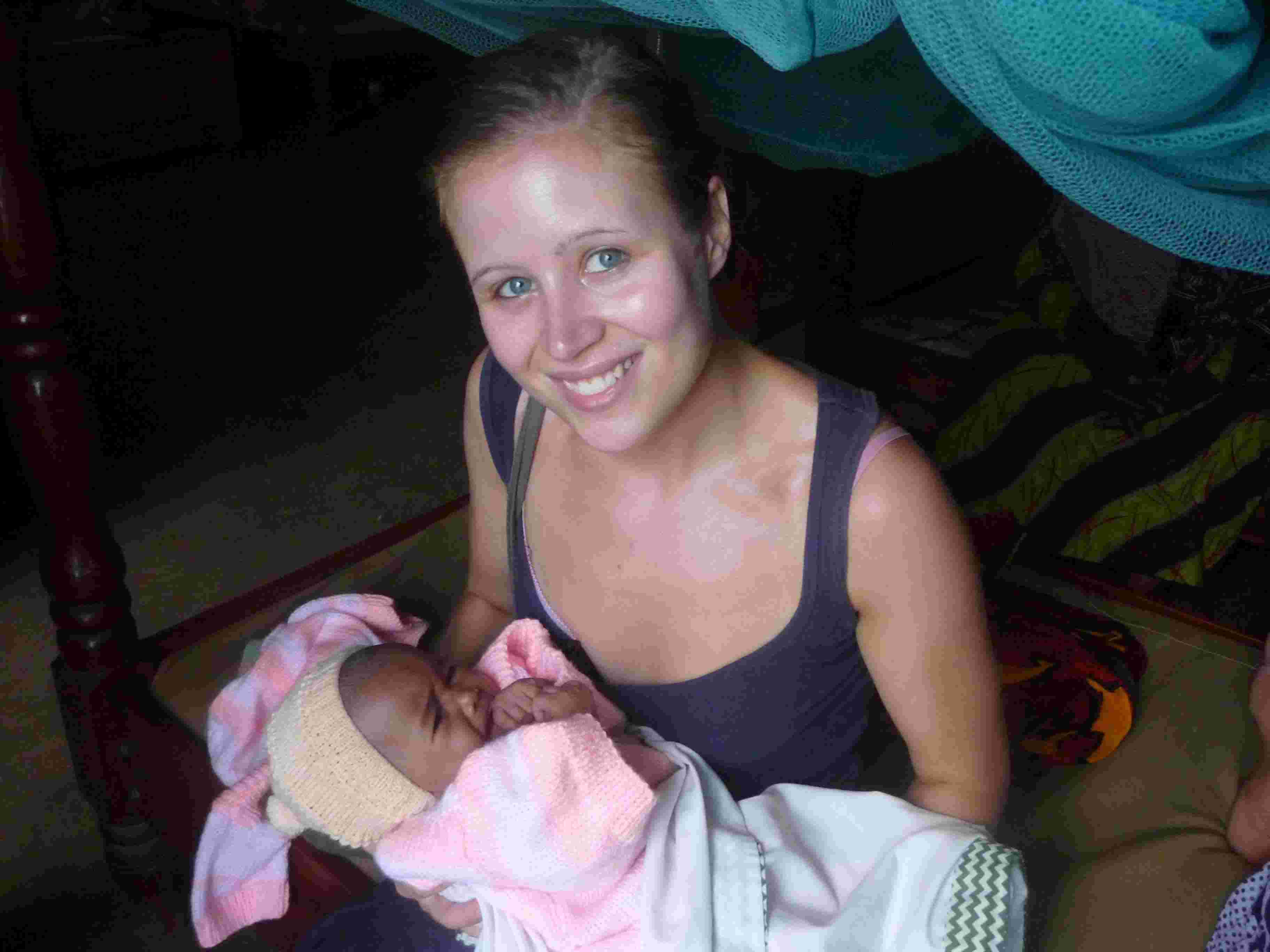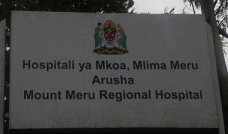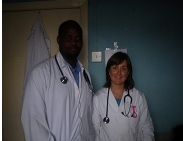Bursary Reports 2010
Helen Dale
Report as a GEC 1 at Birmingham University.
I started my first week at Birmingham University as a graduate entry medical student with a mixture of trepidation and excitement for the forthcoming year. I had been told that the first year of the graduate entry course (GEC) was very work intensive, and required high levels of self-motivation and group-working skills necessary for the self-directed learning component of the course. It seemed like a very ambitious task to learn the equivalent of the first two years of the undergraduate medical course in one year, but having made it through the year, I can tell you that it is possible!
The first year of the GEC course is predominantly 'taught' by PBL (problem based learning). This involves working in small groups (8-9 students) in rooms at the medical school. Each week we were given a clinical scenario: about half a page of a history of a patient. From this scenario, we would as a group, run through the following process:
- Define any terms we were not familiar with.
- Summarise the key points of the scenario.
- Create a 'mind-map' - where we would brainstorm ideas on the
whiteboard about main themes thrown up in the scenario. These would
usually cover areas such as the biological/medical sciences, e.g.
physiology, anatomy, epidemiology etc., and social sciences e.g.
psychology, sociology, law, ethics, public health, health
economics). Through this we could discuss what we already knew, and
what we needed to go away and learn about.
- From this, we tried to put our ideas into order and make links between topic areas.
- Create learning objectives based on the topics we felt we needed to cover that week.
- Go away and learn independently the topics identified in the learning objectives.
- Meet up again later in the week, and discuss what we learnt and identified areas we didn't understand well.
- From the areas we didn't understand, create questions to ask an expert panel for clarification.
The course was divided into six blocks; cells and cancer, cardiovascular and respiratory systems, neuroscience, gastrointestinal and urinary systems and metabolism, reproduction, and infection and immunology. Each block consisted of three to four PBL scenarios.
We also had supplementary lectures during the week, which covered areas related to the scenario that week, and three hour anatomy tutorials with an anatomy demonstrator. The anatomy teaching was supplemented by a prosectorium visit every four weeks. This was invaluable for consolidating our anatomy knowledge and understanding how the two-dimensional images in the textbooks related to actual three-dimensional bodies.
Our clinical experience consisted of a day at a General Practice Surgery every week. I was based in Riverbrook Practice in Stirchley. This provided us with a break from the textbooks, and a chance to see how the diseases we were studying affected individuals in their day to day lives. It was a great opportunity to develop our communication and history taking skills, by talking to patients, and also a chance to practice clinical examination skills. I personally found this day to be the most enjoyable, and a time when it was possible to see how the theoretical work was practically applied to treat patients.
During the first month of the course we had the opportunity to complete a Basic Life Support (BLS) course. This took place on Monday evenings, which consisted of four sessions with an assessment at the end. I really enjoyed this course as it allowed me to develop some practical skills.
Outside of the academic work, I became involved in the University Mountaineering Club. I went on a number of climbing trips, including a winter mountaineering trip to the Cairngorms over the new year, trips to Wales and the Peak District, and a trip to Fontainbleau in France at Easter. I also joined a running club and the medics swimming club.
Overall, the GEC students were a very friendly group and we got to know each other well throughout the year. Despite the intensity of the course, I did enjoy it and learnt a great deal which has put me in good stead for clinical work this year, and in the future. I would like to thank Kidderminster Medical Society for the bursary that they awarded me; it certainly made life easier for me during this year and meant that I could focus wholly on my studies without unduly worrying about the financial pressures of becoming a student again. I am also extremely grateful to the Society for inviting me to the Annual Dinner and for making me feel so welcome.
Helen Dale
An Elective In Zanzibar
Amy Mountain
5th Year Medical Student-Keele University
I
chose to undertake my medical elective in Zanzibar, a beautiful tropical island off the east coast of Tanzania. The hospital where I worked was called Mnazi Mmoja, the only government run hospital on the Island serving a population of 1 million people.
The hospital is evidently deprived of resources-yet the staff utilise what they do have incredibly well. I was shocked to learn that the only source of oxygen was in the intensive care unit. Patients also have to pay for all interventions, medications and investigations. Prices ranged from 75 pence for a full blood count to 15 pounds for an above knee amputation. This was all very expensive for patients who try to avoid going to hospital and will seek ‘local remedies’ in the villages instead.
I spent 4 weeks on the female medical ward as well as time in the eye hospital, paediatrics and psychiatry. Experience in so many specialities was great and so were the staff. Common day to day presentations included malaria, diabetes, hypertension, anaemia (which was incredibly prevalent), complications of human immunodeficiency virus and diarrhoea.

One of the most shocking sights was when patients had severe diarrhoea. If they were very weak they would be placed on a bed with the mattress folded in half. This ensured that when they defaecated their faeces fell through the rusty metal springs of the bed into a bucket below. No attempts were made to preserve the patients’ dignity.
There were many cases of cholera during our time there, possibly due to a 3 month power cut that affected the water supply.
A big learning curve for me was that resources were simply not available to perform multiple investigations and seek out a diagnosis as we do in the UK. This often meant many patients were discharged without a diagnosis. At first I found this frustrating but it did highlight how fortunate we are in the NHS to have a battery of tests at our fingertips and this is probably taken for granted at times.
I learned a great deal from this experience and I would like to thank the Kidderminster Medical Society for the bursary towards my elective. It made my elective an even more enjoyable experience and one I shall never forget!
Amy Mountain
Kimberley Eaton Charnock
Year 5 Medical Elective -
Barts and the London
For my medical elective I chose to go to Tanzania, Africa. The main reason for this was because I thought going to a third world country would give me great insight into working with few resources, being challenging as well as experiencing a completely different culture. I went to a large government hospital called, Mount Meru District hospital in Arusha, (Northern Tanzania) where I worked in obstetrics, general medicine and casualty/outpatient department. I also went to a remote Maasai village where I spent a week at a dispensary, similar to a general practitioner (GP).
In the obstetrics department I spent time learning from the staff, made up of doctors and nurses who were experienced in assisting childbirth. The delivery suite was an open 20 bedded ward, where all enter, were assessed and gave birth. So you could see all stages of labour simultaneously. Whilst I was there I assisted in vaginal deliveries, a breech delivery, neonatal resuscitation, watched caesarean sections and went on the daily ward rounds for all obstetric and gynae patients. This experience enabled me to develop my own confidence in delivery babies naturally, particularly as there was no analgesia.


The general medical ward was made up of all medical specialities. There were a total of 60 beds, half female, half male. But when the beds were full there would be more than one person to a bed, sometimes this made it difficult to examine patients properly. Often patients had infectious diseases such as gastro-enteritis/pneumonia and were sharing beds, which was obviously not ideal. I learnt how to treat diseases that are not common in the United Kingdom (UK), such as malaria and HIV as well as how common diseases such as pneumonia and asthma are treated in a third world country where there are no oxygen facilities. Here I worked with the Intern doctors (foundation year doctor equivalent), which was very good because we compared our education and learnt a lot from each other. I found there were limited investigation services available in the hospital, and even if a doctor ordered an investigation it was often not carried out due to demand, or no availability. There was no CT or MRI scanner and only one ultrasound and X-ray facility so actually getting a patient to receive this was rare, compared to UK. Anti-biotics were often unnecessarily used or multi anti-biotics were used, doctors were aware they were over-using antibiotics but said it was due to lack of availability of investigations, such as sputum sample culture and therefore it was better to give many broad-spectrum antibiotics. I think this will be a much bigger problem in the future, particularly in those with HIV. I saw quite a few diseases there which I will probably never see in the UK, such as a death from Pellgra, a vitamin deficiency.
I spent one week with a remote large Maasai tribe, where the population was about 4,000-6,000 people. During this week I went to the dispensary daily, where I worked with a doctor and a nurse. This was very similar to a general practitioner (GP). We would see patients on a first come first see basis. Patients often travelled from far away. I was surprised how many patients came with similar problems to the UK, such as head and back pain, muscle spasm etc. The doctor also ran an antenatal clinic one afternoon, a current topic of improvement in Tanzanian, where they are trying to reduce maternal and baby mortality. This week was very enjoyable, where I learnt about tribal life, Maasai culture, all helped by living with them, and I also met the local “medicine/spiritual” healer man. He still sees a lot of patients for a variety of bodily and mental complaints, however the popularity is reducing with the availability of modern medicines and the ever-popular anti-biotic!
I spent my last week in the casualty/outpatient department. As there are no GPs in Tanzania, all patients present to the outpatient or casualty department and are seen on first come first seen basis. This was a busy week, with many patients of every speciality including follow-up patients. It is from this department that people are admitted from the hospital too.
I thoroughly enjoyed my time in Tanzania and am eternally grateful for support I gained before going. All this made it possible for me to go. I learnt many things about the difference in healthcare worldwide and the importance of team work and a variety of education amongst health care workers, and just how lucky we are in England to have the NHS team.
Kimberley Eaton-Charnock
A report from Gemma Plant who was last year's recipient at Birmingham University Medical School.
I am writing to express my sincere gratitude to the society for the Bursary awarded to me in 2009. This has provided me with invaluable financial support during my first year of the Graduate Entry Course (GEC) at the University of Birmingham Medical School. The money awarded by the Society made a significant contribution to my tuition fees for the year and helped massively to ease the financial burden of my return to student life after four years of full-time work.
I graduated from The University of Birmingham in 2005 with First Class Honours Degree in Biological Sciences, and then worked in Pharmaceutical Sales until returning to University last year. I have always been interested in Medicine but my desire to become a doctor grew significantly as a result of exposure to the profession in my role as a Medical Representative. The decision to return to university was a difficult one, since it involved many sacrifices. Before applying to university I felt I should gain direct experience of medicine. To do so I acted as a volunteer at Mary Steven Hospice, and I shadowed a number of doctors in both general practice and hospital. I was aware that there is significant competition for places on graduate courses and was delighted when I was offered a place to study medicine.
The first year of the graduate course was very intense, involving study of what is normally two years worth of pre-clinical theory in nine months. Much of the learning process was “self taught” with the majority of the material in the year being predominantly based on problem based learning (PBL).
Overall I had a great year and found the work challenging but importantly interesting and rewarding. I have made some wonderful friends amongst my peers, since we depended upon one another for support as we progressed through the PBL modules. The learning process and experience was fantastic and has increased my passion to enter the medical profession.
Having successfully passed the initial year, I have now joined the third year of the Undergraduate course and am currently on my first clinical placement at Walsall Manor Hospital. This is an integrated medicine and surgery placement and I have already seen many interesting cases and learnt many new skills. Although the first few weeks in a hospital setting were daunting I love every minute of the experience and can honestly say I have never regretted my decision to return to study medicine. I will remain forever grateful and indebted to Kidderminster Medical Society for being a part of making it possible.
I had the pleasure of attending your annual dinner last month with one of my GEC colleagues. Both Julia and I had a lovely evening and very much appreciated being invited and made to feel so welcome.
Hopefully I will have the opportunity to train or work in the Kidderminster area and in some small way be able to repay the investment the society has made in my career.
Once again, my sincerest thanks for you support and commitment to me.
With all best wishes to the society and its members,
Gemma Plant
Click HERE to go back to the Bursary Report Index